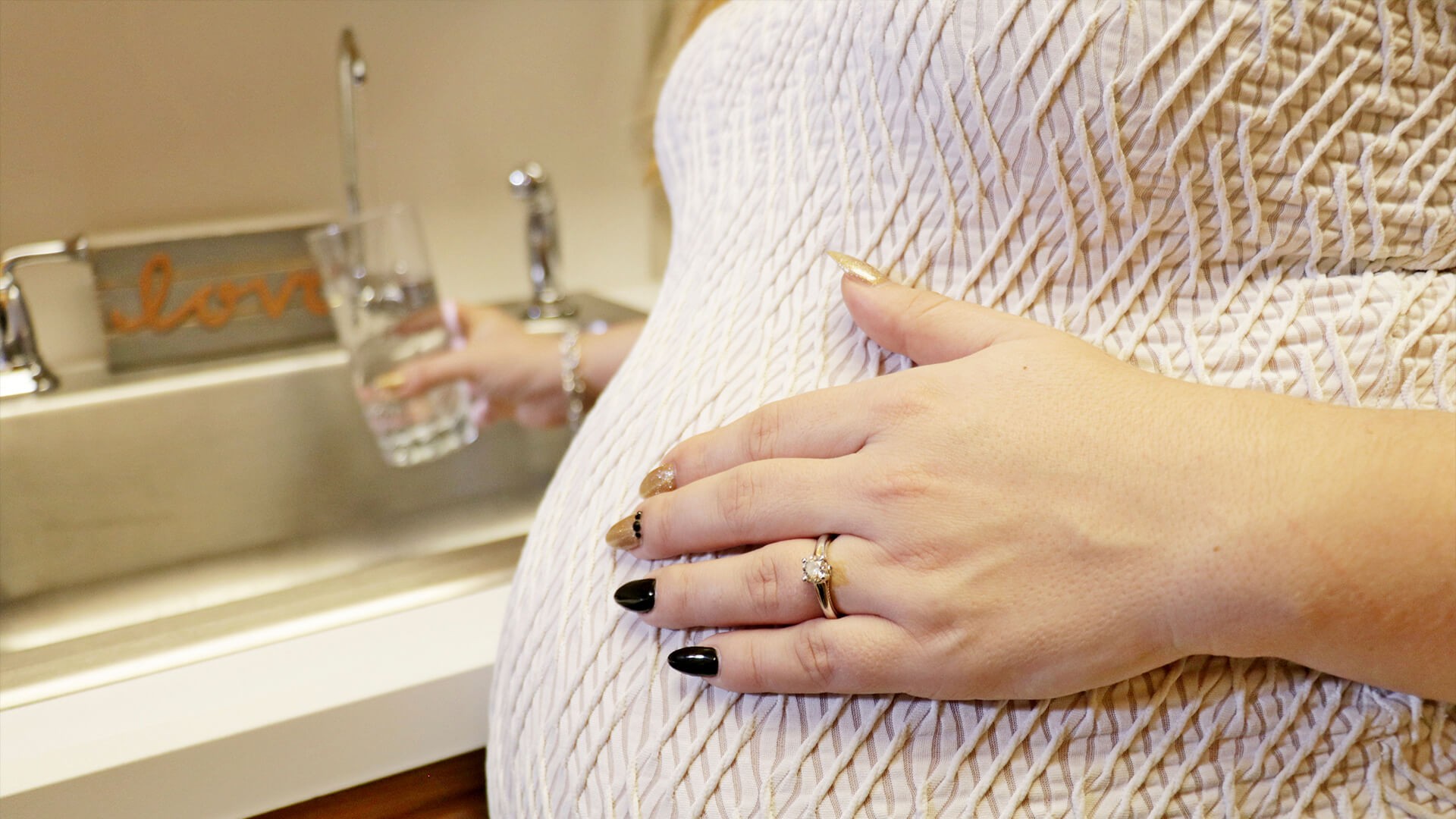
Water supports your body’s vital processes. For that reason, drinking clean, fresh water is essential to having a safe pregnancy and a healthy baby.
In this article, we will provide you with a tool to calculate your daily water intake based on your body weight and other factors. We will discuss:
- The importance of drinking water during pregnancy
- How much water you should drink during your pregnancy?
- Symptoms of dehydration during pregnancy
- The health benefits of drinking more water during pregnancy
- Causes of dehydration during pregnancy
- Tips to help you stay hydrated
The general recommendation by medical experts is that expecting mothers should drink about ten eight-ounce glasses of water or other beverages each day. Women need more water to keep their bodies’ vital systems running during pregnancy.

Plain water is ideal, but milk, juice, coffee, and tea all contain plenty of water and count toward your fluid intake. Calorie-rich fruit juices and sugary drinks can cause swelling, so try and replace them with plain water as much as you can.
In some cases, dehydration causes contractions that may bring on early labor. Giving birth early can be extremely dangerous for you and your baby. Remember, drinking too much water during pregnancy is very difficult to do.
Having a water filter installed in your home can provide you with an instant supply of clean, healthy water that is ready to drink. Contact High Water Standard today to get a water filtering system suited to your specific needs.
How much water should I drink while pregnant?
The recommended amounts of water each woman should drink during pregnancy vary depending on several other factors.
- Body weight — Our bodies need 1 ounce of water for every 2 pounds of body weight. Your growing baby will add between 20 and 30 pounds to that number, so you need to adjust your water intake accordingly.
- Activity levels — Your body uses up more water during exercise as it works to keep your muscles hydrated. Add one eight-ounce glass of water for each hour of exercise you take while pregnant.
- Temperature — In warmer environments, the body produces sweat to keep us cool. The hotter we get, the more we sweat. Add an eight-ounce glass of water for every hour you spend in temperatures of 70 degrees or more.
How to calculate the ideal water intake for pregnant women
To find out how much water you should drink during pregnancy, use our body weight calculator.
100 pounds = 10 glasses
120 pounds = 10.5 glasses
140 pounds = 11 glasses
170 pounds = 11.5 glasses
200 pounds = 12 glasses
Is drinking a lot of water good for pregnancy?
Water aids your body’s processes. If you don’t drink enough, you will feel your energy levels drop as your body struggles to keep up. The health benefits of proper water consumption are well-known, but there are some additional benefits of drinking more water during pregnancy.
- Water eases constipation — Many women experience constipation while pregnant. Drinking plenty of water will keep everything moving, helping to prevent additional problems like hemorrhoids and urinary tract infections.
- Nutrients — Water carries oxygen and nutrients to all the organs and cells in your body. It is critical you drink enough clean, filtered water to make sure you and your baby get all the nutrients from the food you eat.

- Water eases swelling — Your body will retain more fluid if you become dehydrated. If you are swollen, drinking more water can help. If swelling is excessive or sudden, contact your doctor, as this can be a sign of preeclampsia.
- Preventing dehydration — Dehydration is dangerous for everyone but especially for a pregnant woman. Dehydration during pregnancy can cause cramps headaches, blood pressure changes, exhaustion, and even a stroke.
Causes of dehydration during pregnancy
There are several reasons you could experience dehydration during pregnancy.
- Increased blood volume — A pregnant woman’s blood volume increases by 50 percent, which is one of the leading causes of dehydration in early pregnancy.
- Morning sickness — About 50 percent of pregnant women suffer from morning sickness, which leads to water loss. Nausea and vomiting may cause you to limit your fluid intake, but you must drink water to avoid dehydration.
- Amniotic fluid formation — Amniotic fluid allows for easier fetal movement and development. The formation of this fluid requires extra water.
- Excessive sweating — Women tend to sweat more while pregnant. If they do not replace this lost water, they may become dehydrated.
- Diarrhea — During the third trimester, pregnant women are prone to diarrhea, which also causes you to lose water.
What are the symptoms of dehydration during pregnancy?
The effects of dehydration vary according to how much water your body has lost and why. Watch out for the following signs and symptoms, and make sure you are drinking enough water the moment you notice any of them.
- Increased thirst
- Chapped lips
- Tiredness
- Anxiety
- Increased heart rate
- Decreased urination
- Dark yellow urine
- Dizziness
- Headaches
- Nausea
- Constipation
How to stay hydrated
Sip steadily throughout the day rather than consuming large amounts of water in one go. Fill your water bottle from a water filter system provided by our water filter installation service and keep it handy all day. Sip filtered water before, during and after you work out, or if you find yourself outside on a hot day.
FAQs
Q: Could I drink lemon water while pregnant?*
A: You can drink lemon water while pregnant. However, physicians do not recommend it if you have gastritis. If you are concerned, consult your doctor before drinking lemon water.

Q: Is water important for pregnancy?*
A: Drinking fresh, clean water is extremely important for a healthy pregnancy. It helps your body to provide your baby with much-needed nutrients and protection.
Q: How much water should I drink while pregnant?*
A: You should drink at least ten eight-ounce cups during the first two trimesters and increase the amount of water you drink to 12 to 13 cups during the third trimester.
Q: How can I increase my water intake during pregnancy?*
A: To make a healthy habit of drinking water, follow these steps:
- Sip slowly before and after each meal
- Carry a bottle of fresh water with you
- Set reminders or use an app that reminds you to drink
- Choose water instead of juice or other beverages
- Call High Water Standard for a quality water filter
Q: What are the symptoms of dehydration during pregnancy?*
A: The most common symptoms of dehydration are:
- Tiredness
- Dry throat, mouth, lips, or skin
- Less frequent urination or dark-colored urine
Q: What can I drink to stay hydrated while pregnant?*
A: The healthiest way to stay hydrated during pregnancy is to drink clean, filtered water.
Don’t underestimate the importance of water during pregnancy. It is also crucial to make sure you’re drinking water that is clean and healthy. At this special time, treat yourself with water that is healthy and free of the contaminants typically found in tap water.
Call High Water Standard to have the water in your home tested and source a water filtering solution that can provide you and your growing family with healthy, clean water.






